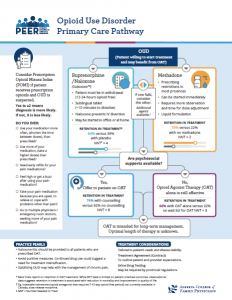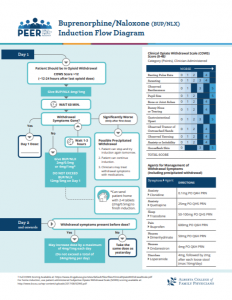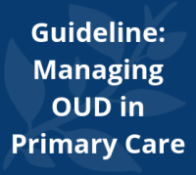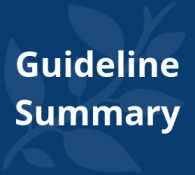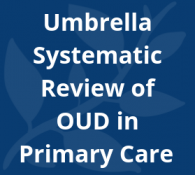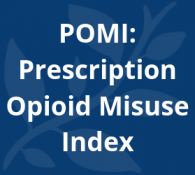Managing Opioid Use Disorder in Primary Care
PEER Simplified Guideline
The Patients Experience Evidence Research (PEER) Simplified Guideline: Managing Opioid Use Disorder (OUD) in Primary Care provides practical recommendations for treatment of OUD for primary care practitioners. All recommendations are intended to assist with, not dictate decision making in conjunction with patients. The guideline is developed with contributions from primary care professionals with little or no conflict for interest and focused on the highest level of evidence available.
Description and Information
Release Date: May-2019
Revised: Sept-2019
Title: PEER Simplified Guideline: Managing Opioid Use Disorder (OUD) in Primary Care
Authors/Contributors: Christina Korownyk, Danielle Perry, Joey Ton, Michael R. Kolber, Scott Garrison, Betsy Thomas, G. Michael Allan, Cheryl Bateman, Raquel deQueiroz, Dorcas Kennedy, Wiplove Lamba, Jazmin Marlinga, Tally Mogus, Tony Nickonchuck, Eli Orrantia, Kim Reich, Nick Wong, Nicolas Dugru00e9, Adrienne J Lindblad
Description: This guideline provides recommendations for identifying and treating patients with opioid use disorder in primary care. Using the best available evidence, this guideline provides a simplified, shared decision-making approach to common questions experienced by primary care clinicians and their patients with opioid use disorder.
Target Population: Adults over 18 years of age with opioid use disorder
Exclusions: Children, Adolescents, Pregnant/lactating women, Prison populations
Related Tools and Resources
Tools for Practice
- Location, Location, Location: Treating patients with opioid disorder in primary care
- Does this patient taking prescription opioids have opioid use disorder?
- Buprenorphine-Naloxone for Pharmaceutical Opioid Use Disorder
- What is the Incidence of Iatrogenic Opioid Use Disorder?
- Spread the Word: Widespread Distribution of Naloxone to Decrease Opioid-Related Deaths

